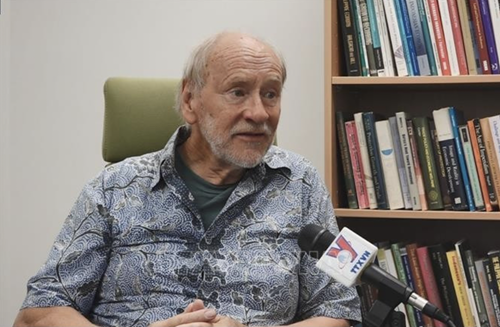In an interview with the Vietnam News Agency (VNA)'s resident correspondents in Sydney on the occasion of the 30th anniversary of Vietnam’s admission to ASEAN (July 28, 1995 – 2025), Prof. Hill stressed that the event was one of the most important developments in the region’s history.
    |
 |
|
Prof. Hal Hill from the Crawford School of Public Policy at the Australian National University (ANU) in an interview with the Vietnam News Agency (VNA)'s resident reporter in Sydney |
He said that ASEAN membership opened the door for Vietnam to learn and engage with the region, and more importantly, Vietnam knew how to combine regional integration with domestic reforms, noting that the Doi moi (renewal) process launched in 1986 laid a foundation for Vietnam to effectively seize opportunities brought by ASEAN.
The scholar pointed out that three decades ago, Southeast Asia was far less developed than it is today, and Vietnam was still a poor country, just beginning to integrate into the international economic and political landscape after decades of war. However, by joining ASEAN, Vietnam gained the opportunity to learn a lot from its neighbors, which had more open economies at that time, and gradually aligned itself with the region’s globalization process.
Vietnam has proactively pushed regional integration while improving its investment climate, expanding economic cooperation, and building its image as a dynamic and responsible member of the region. Once a lagging economy, Vietnam has now emerged as the most dynamic economy in ASEAN in the 21st century.
Vietnam has already overtaken the Philippines in terms per capita income, something that would have been unthinkable 30 years ago, Prof. Hill said, observing that Vietnam is steadily approaching the rank of upper-middle-income countries.
Analyzing Vietnam’s current role in ASEAN, Prof. Hill highlighted three key factors, noting that Vietnam’s large population and geographic size give it a natural influence in the region.
Vietnam is the fastest-growing economies in ASEAN, with the potential to become a key growth driver in the next decade, he said, adding that the country is demonstrating its ability in managing relations with major powers, especially China and the US, thanks to its historical experience and skillful and balanced foreign policy. Vietnam has become a model for how to balance its relations with the two world powers while safeguarding national interests - something many Southeast Asian countries are striving to learn from.
Looking to the future, Prof. Hill said by 2045, Vietnam will be a much more important country within ASEAN and the international arena, because it will be a much more prosperous country. With its current growth momentum, combined with political stability and strong foreign investment attraction, Vietnam will remain a key engine of regional development, he said, describing the country as a standout success story of reform and integration.
If the country maintains its rapid and sustainable growth, it is well on track to achieve the high-income status within the next few decades, he said.
For ASEAN, Prof. hill highlighted the importance of promoting intra-bloc cohesion and strengthening institutional capacity as two key factors in navigating today’s volatile global landscape. He emphasized that ASEAN’s central role can only be sustained if the bloc strengthens its internal capacity, enhances its collective voice, and improves the operational effectiveness of the ASEAN Secretariat.
To avoid being divided by individual national interests, ASEAN must continue building a cohesive community with unity in action, he noted, adding that only by doing so can the bloc maintain its position and uphold its central role in the rapidly evolving regional architecture.
Source: VNA